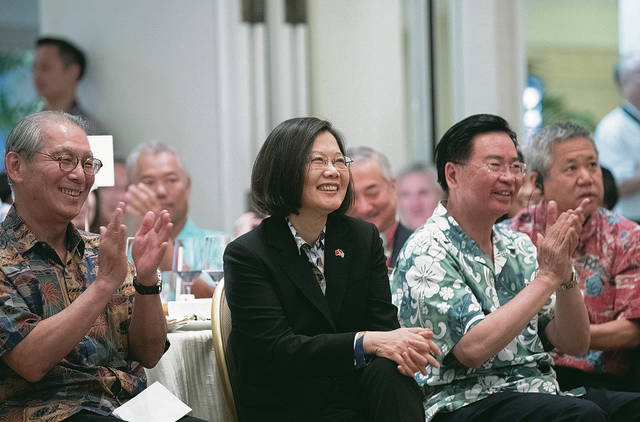Amid growing concerns that a new crisis is brewing between China and Taiwan, independence-leaning Taiwanese President Tsai Ing-wen is in Honolulu for an always controversial yet short visit.
Tsai, who arrived Tuesday afternoon after an eight-day trip to Nauru, the Marshall Islands and Palau, spoke to several hundred community members at The Kahala Hotel and Resort on the 40th-anniversary year of the Taiwan Relations Act.
China opposed Tsai’s visit to Hawaii in 2017 and this trip, her second to Hawaii, maintaining that Taiwan is a province of China and that the “transits” through the United States inflame sensitive relations over an agreed-upon “one China” policy with Beijing.
“Any attempt to create ‘two Chinas’ or ‘one China, one Taiwan’ will be opposed by all Chinese people,” People’s Republic of China Foreign Ministry spokesman Geng Shuang said Thursday.
As for Tsai’s visit to Hawaii, “We firmly oppose the arrangement of such ‘stopovers’ by the U.S. or any other country having
diplomatic ties with China,” Geng said.
He urged the United States to “refrain from sending out any wrong signal to Taiwan-independence forces,” and to uphold Chinese-U.S. relations and peace and stability across the Taiwan Strait.
Tsai has been unwilling to accept the “one China” policy.
Tsai said in her Kahala comments that she rejects a one-China, two-systems approach to government, and that she will safeguard her country’s sovereignty.
Taiwan has “enjoyed very substantive” cooperation with the United States, and “there is evidence of improving Taiwan-U.S. ties,” she said through an interpreter.
“This progress comes from U.S. confidence in Taiwan,” she said, adding that Taiwan won’t “buckle under a bit of external pressure.”
“Taiwan is a trusted partner,” she said. “With Taiwan here, there is an added layer of guarantee to the status quo in the Indo-Pacific. I also want to let everyone know that Taiwan will contribute to the prosperity, security and status quo of the Indo-Pacific.”
On a 2017 transit stop through Honolulu, Tsai visited the USS Arizona Memorial and the East-West Center. She will visit the East-West Center today for the opening of a photo exhibit commemorating the Taiwan Relations Act anniversary, the center said.
Other parts of her itinerary were not clear. Tsai is expected to leave today for Taipei.
“We like to welcome her to Hawaii,” said Charles Huang, president of the Taiwanese Association of America Hawaii Chapter. “Taiwan and Hawaii have a special bond. We share the language, the DNA and culture. We had the voyaging canoes that travel the Pacific.”
A U.S.-Chinese 1979 joint communique switched diplomatic recognition from Taipei to Beijing and acknowledged there is but one China and that Taiwan is a part of China.
The 1979 Taiwan Relations Act provides the legal basis for the unofficial relationship between the United States and security partner Taiwan, authorizing commercial and cultural activities and military weaponry “to maintain a sufficient self-defense capability.”
Kent Wang, a research fellow at the Institute for Taiwan American Studies, wrote in Asia Times last week that the TRA “has been the foundation of a strong history of trust and cooperation between the United States and Taiwan,” with that country proving to be a “reliable and strong partner for the U.S. in advancing freedom, opportunity and prosperity.”
A bipartisan group of U.S. senators Tuesday introduced the Taiwan Assurance Act to enhance the U.S.-Taiwanese relationship, with senators noting Taiwan’s “flourishing democracy” and the desire to send “a message that China’s aggressive cross-Strait behavior will not be tolerated.”
The United States on Sunday sent a destroyer and Coast Guard cutter through the Taiwan Strait, and an arms deal might see the sale of F-16V Viper fighters to Taiwan.
RAND senior political scientist Michael Chase wrote late last month that “the risk of a serious crisis between China and Taiwan is growing.”
Beijing might implement a multifaceted pressure campaign to punish and coerce Taiwan into being more compliant, Chase said.
“This pressure campaign could intensify in the next 12 to 18 months — particularly in the lead-up to and immediately following Taiwan’s 2020 presidential election — to the extent that it triggers a new cross-Strait crisis,” according to Chase.






